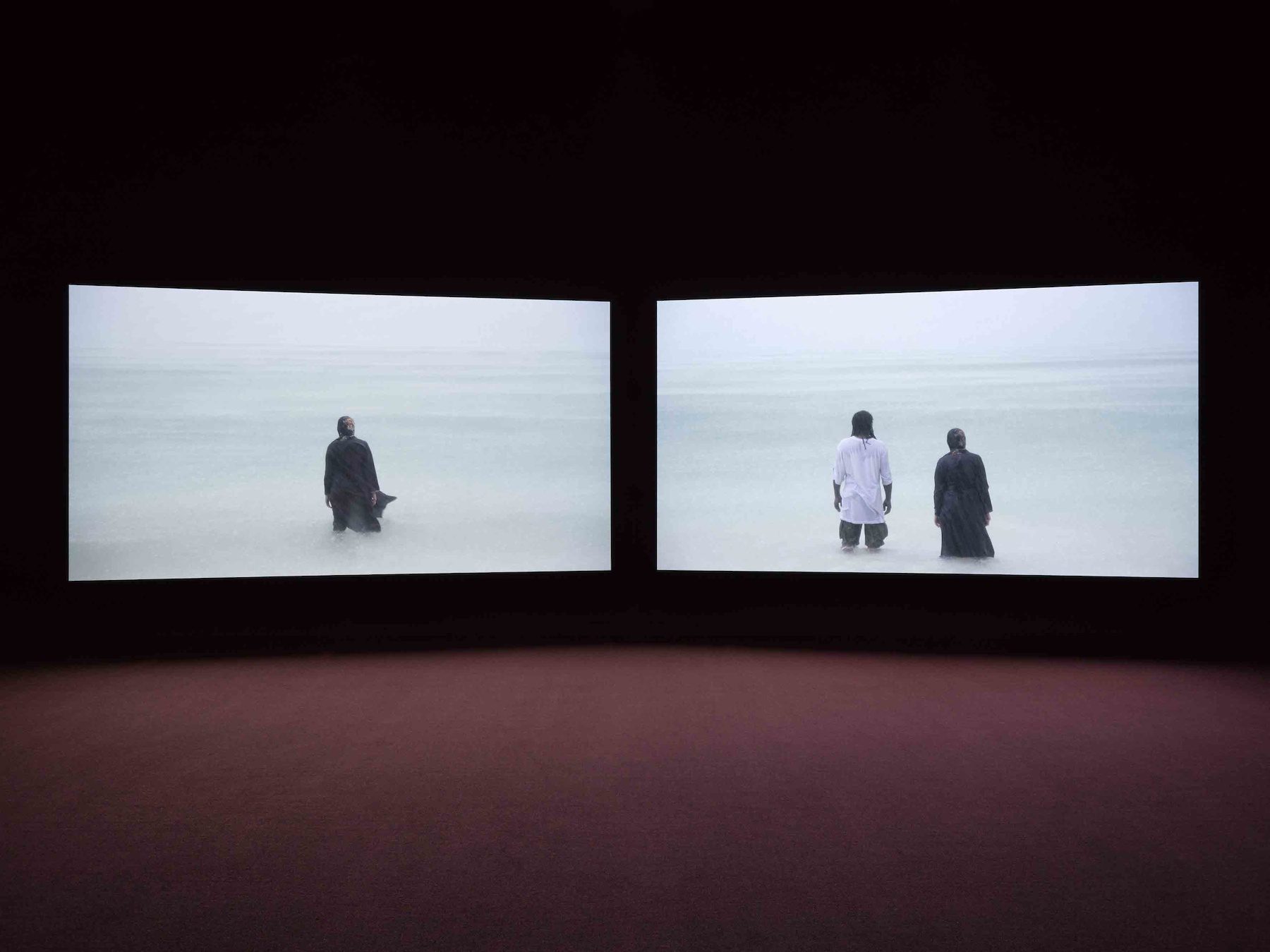John Akomfrah has been chosen from a shortlist including Neïl Beloufa, Amy Franceschini/Futurefarmers, Lamia Joreige, Nástio Mosquito and Bedwyr Williams.

John Akomfrah Auto Da Fé, 2016 Two channel HD colour video installation, 5.1 sound 40 minutes 30 seconds © Smoking Dogs Films; Courtesy Lisson Gallery
UK, contemporary-artist John Akomfrah has been chosen from a shortlist of 6 of the world’s most important artists to win the UK’s leading prize for international contemporary art, Artes Mundi 7.
Ken Skates AM, Cabinet Secretary for Economy and Infrastructure, announced John Akomfrah as the winner of the biennial award, with a prize sum of £40,000, at a ceremony held at National Museum Cardiff.
John Akomfrah’s work often explores the global diaspora, history, memory, colonialism and its legacy through lens-based media. The range of single and multiscreen films allows us to reconsider the ways in which we think about both personal and collective histories, the grand narratives of our times, across nation states and continents. His work has often given voice to underrepresented communities and their universal stories told through the creation of sublime imagery, and evocative and immersive soundtracks.
In Auto Da Fé (2016) Akomfrah specifically uses the aesthetics of a period drama to consider the historical and contemporary causes of migration; in this work he focuses on religious persecution as a major cause of global displacement. The subtle historical references combined with its sumptuous costumes, locations and sets, allude to the reality of migration and persecution that has taken place throughout the centuries.
The film brings together 8 interconnected mass migrations which have taken place during the past 400 years beginning with the little known 1654 fleeing of Sephardic Jews from Catholic Brazil to Barbados. Auto Da Fé then continues to reveal many more examples of displacement throughout history and in the present day for example migrations from Hombori, Mali and Mosul, Iraq. The landscape in which this work was filmed is deliberately ambiguous in an attempt to reflect the universal and ongoing nature of these stories. As in other recent works such as Tropikos (2016) and Vertigo Sea (2015) the ocean plays an important role – it is an intermediate zone between the past and present, local and global and holds the memories of all those individual and collective journeys.
John Akomfrah winner of Artes Mundi 7 has said, “I am absolutely touched by this and enormously grateful for the chance it offers to finally finish off something I have been planning for over a decade. Over the years, Artes Mundi has chosen some very brilliant artists for this award: all were important artists doing challenging and engaged work, and to join that group is a huge honour and responsibility.”
Karen Mackinnon, Artes Mundi Director has said, “We are delighted to announce John Akomfrah as the winner of the seventh biennial Artes Mundi Prize. Artes Mundi champions leading contemporary artists, from across the world, whose work relates to every aspect of our personal lives in a global society. Artes Mundi’s focus on the human condition finds a unique resonance in these uncertain times. We want to thank our panel of judges for their sensitivity, thoroughness and intellectual rigour in selecting the winner. The judges felt that all the shortlisted artists showed outstanding work. However the prize is awarded not just for the work in the exhibition but for the continued excellence of their practice over the past 8 years. The Artes Mundi 7 Prize was awarded for Akomfrah’s presentation of Auto Da Fé and for a substantial body of outstanding work dealing with issues of migration, racism and religious persecution. To speak of these things in this particular moment feels more important than ever.”
Oliver Basciano, Artes Mundi 7 Judging Chair has said, “We are excited to award John Akomfrah the Artes Mundi7 prize in recognition of his extraordinary contribution to art over the past eight years. We do so in recognition of both his newly-presented work Auto Da Fé (2016) and in appreciation of the artist’s ability to tell stories with historical depth, exploring social and political concerns through exquisite cinematic language in films such as Peripteia (2012), Unfinished Conversation (2013), Vertigo Sea (2015). Over his long career, Akomfrah’s practice underlines how art has the unique ability to reflect on and shape the human condition, in alignment with fundamental principles of Artes Mundi.”
John Akomfrah’s work alongside the other shortlisted works are on display at National Museum Cardiff and Chapter until 26th February.
.
More Editorial